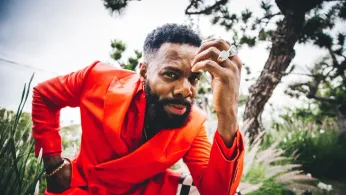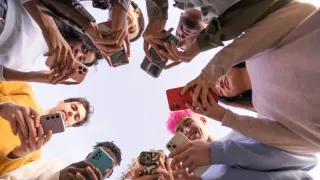
3 hours ago
Colman Domingo’s Cowardly Lion in “Wicked: For Good” Reclaims an LGBTQ+ Legacy
READ TIME: 3 MIN.
Colman Domingo, acclaimed for his nuanced performances in projects like “Euphoria” and “Rustin,” is set to voice the Cowardly Lion in “Wicked: For Good,” directed by Jon M. Chu. The announcement, made by the official “Wicked” Instagram account on October 20, 2025, unveiled a playful video of Domingo emerging from behind a stuffed lion, declaring, “See you in Oz!” .
This casting is more than a star turn—it’s a deliberate nod to the Cowardly Lion’s complex place in Queer film history. The character, first immortalized in the 1939 “The Wizard of Oz,” has long been recognized as a coded symbol of queer identity, a legacy that Domingo, an openly gay, Black actor, brings into sharp, contemporary focus .
“Wicked: For Good” expands on the backstory of the Cowardly Lion, connecting the events of “Wicked” to the canonical Oz narrative. In the original “Wicked,” there is a pivotal classroom scene where Elphaba (Cynthia Erivo) and Fiyero (Jonathan Bailey) rescue a lion cub from captivity, an act of compassion that sets the cub on a path toward becoming the adult Lion . In Chu’s sequel, that cub reappears as Domingo’s Cowardly Lion, now grappling with resentment toward Elphaba for the trajectory his life has taken.
As the story’s timeline begins to converge with the events of “The Wizard of Oz,” the Lion joins Dorothy, the Tin Man, and the Scarecrow on their journey down the Yellow Brick Road to meet the Wizard, played by Jeff Goldblum .
Director Jon M. Chu has emphasized the film’s intent to present Elphaba as a “superhero,” providing a new lens through which to view heroism—particularly female heroism—without relying on traditional male archetypes. This reexamination of identity extends to the Lion, whose journey can be read as a metaphor for self-acceptance and the search for courage in a world that demands conformity .
Since the original MGM classic, the Cowardly Lion has been interpreted as a queer-coded figure—a reading reinforced by actor Bert Lahr’s camp performance and the Lion’s mannerisms, which mirrored stereotypes of effeminate men in 1930s Hollywood . The term “pansy” itself—once a slur used to demean gay men—became shorthand for a certain kind of flamboyance and sensitivity that the Lion embodied, even as the Hays Code restricted overt Queer representation on screen .
The Lion’s coded queerness was not lost on Queer audiences, who found in his quest for courage a reflection of their own struggles for acceptance and authenticity in a repressive society. This subtext turned the Cowardly Lion into a subtle icon—one of many in a film that, with Judy Garland’s Dorothy at its center, would become a touchstone for queer culture and the rallying cry, “Friend of Dorothy” .
Domingo’s casting as the Cowardly Lion brings unprecedented visibility and resonance to the character’s queer-coded legacy. As an openly gay actor who has spoken publicly about the significance of Queer storytelling, Domingo’s involvement signals a shift from subtext to text, allowing the Lion’s journey to be read more explicitly as one of queer becoming and resilience .
“Wicked: For Good” arrives at a time when representation in mainstream cinema is both more visible and more fiercely debated than ever. For Queer viewers, seeing a Black, gay actor embody a role with such a rich—and fraught—history of coded queerness is significant. It offers an opportunity to reframe the Lion’s narrative: not as a story of shame or inadequacy, but as one of pride, self-acceptance, and chosen family .
Chu has described the film’s approach as one that “redefines what heroism looks like for women on screen,” but the same could be said for queer heroism, as embodied by the Lion’s arc . By reclaiming and celebrating the Lion’s “pansy past,” Domingo’s performance promises to offer Queer audiences a new kind of hero—one whose courage lies in authenticity rather than bravado.
The anticipation for “Wicked: For Good”—which will continue to trace the intertwined journeys of Elphaba and Glinda, while placing Domingo’s Cowardly Lion at the center of Oz’s evolving mythology—underscores the enduring resonance of the Oz stories for Queer audiences . With Domingo’s Lion, the film has the potential to both honor the coded histories of queer representation and offer a new, affirming vision for the future.
As the film’s release approaches, both fans of the Oz legacy and advocates for Queer representation in media will be watching closely—to see how “Wicked: For Good” not only retells a classic, but also reclaims its queer heart for a new generation .






